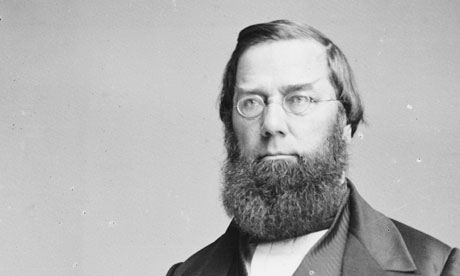
The First Environmentalist? Speech From 1847 Predicts Human-Induced Climate Change
Who was the first conservationist? As The Guardian points out, we often think about John Muir and Henry David Thoreau, but there's another name of note, U.S. Congressman George Perkins Marsh, the man who can claim to be "the person who first publicised the now largely unchallenged idea that humans can negatively influence the environment that supports them." In other words, one of the first climate activists.
From The Guardian:
I would argue his defining moment came on 30 September, 1847, when, as a congressman for theWhig party (a forerunner of the Republican party), he gave a lecture to the Agricultural Society of Rutland County, Vermont. (The speech was published a year later.) It proved to be the intellectual spark that led him to go on and publish in 1864 his best-known work, Man and Nature: Physical Geography as Modified by Human Action.
More than 160 years on, it really does pay to re-read his speech as it seems remarkably prescient today. It also shows that he was decades ahead of most other thinkers on this subject. After all, he delivered his lecture a decade or more before John Tyndall began to explore the thesis that slight changes in the atmosphere's composition could cause climatic variations. And it was a full half a century before Svante Arrhenius proposed that carbon dioxide emitted by the "enormous combustion of coal by our industrial establishments" might warm the world (something he thought would be beneficial).
From the speech:
Man cannot at his pleasure command the rain and the sunshine, the wind and frost and snow, yet it is certain that climate itself has in many instances been gradually changed and ameliorated or deteriorated by human action. The draining of swamps and the clearing of forests perceptibly effect the evaporation from the earth, and of course the mean quantity of moisture suspended in the air. The same causes modify the electrical condition of the atmosphere and the power of the surface to reflect, absorb and radiate the rays of the sun, and consequently influence the distribution of light and heat, and the force and direction of the winds. Within narrow limits too, domestic fires and artificial structures create and diffuse increased warmth, to an extent that may effect vegetation. The mean temperature of London is a degree or two higher than that of the surrounding country, and Pallas believed, that the climate of even so thinly a peopled country as Russia was sensibly modified by similar causes.


